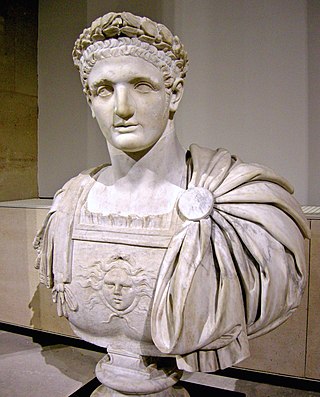
Domitian was Roman emperor from 81 to 96. The son of Vespasian and the younger brother of Titus, his two predecessors on the throne, he was the last member of the Flavian dynasty. Described as "a ruthless but efficient autocrat", his authoritarian style of ruling put him at sharp odds with the Senate, whose powers he drastically curtailed.

Flavius Josephus or Yosef ben Mattityahu was a Roman–Jewish historian and military leader. Best known for writing The Jewish War, he was born in Jerusalem—then part of the Roman province of Judea—to a father of priestly descent and a mother who claimed royal ancestry.
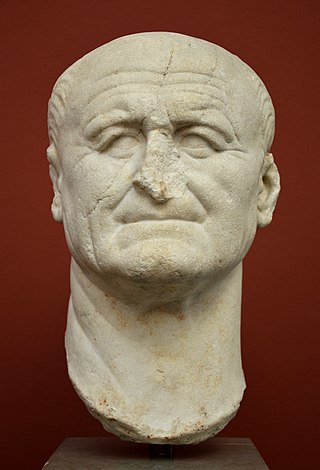
Vespasian was Roman emperor from 69 to 79. The last emperor to reign in the Year of the Four Emperors, he founded the Flavian dynasty, which ruled the Empire for 27 years. His fiscal reforms and consolidation of the empire brought political stability and a vast building program.
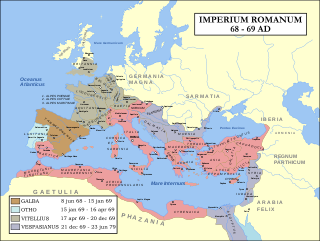
AD 69 (LXIX) was a common year starting on Sunday of the Julian calendar. In the Roman Empire, it was known as the Year of the consulship of Galba and Vinius. The denomination AD 69 for this year has been used since the early medieval period, when the Anno Domini calendar era became the prevalent method in Europe for naming years.

The 60s decade ran from January 1, AD 60, to December 31, AD 69.

The 70s was a decade that ran from January 1, AD 70, to December 31, AD 79.
AD 70 (LXX) was a common year starting on Monday of the Julian calendar. At the time, it was known as the Year of the Consulship of Vespasian and Titus. The denomination AD 70 for this year has been used since the early medieval period, when the Anno Domini calendar era became the prevalent method in Europe for naming years.

Gaius Plinius Secundus, known in English as Pliny the Elder, was a Roman author, naturalist, natural philosopher, and naval and army commander of the early Roman Empire, and a friend of the emperor Vespasian. He wrote the encyclopedic Naturalis Historia, a comprehensive thirty-seven-volume work covering a vast array of topics on human knowledge and the natural world, which became an editorial model for encyclopedias. He spent most of his spare time studying, writing, and investigating natural and geographic phenomena in the field.

Titus Caesar Vespasianus was Roman emperor from 79 to 81. A member of the Flavian dynasty, Titus succeeded his father Vespasian upon his death, becoming the first Roman emperor ever to succeed his biological father.

Berenice of Cilicia, also known as Julia Berenice and sometimes spelled Bernice, was a Jewish client queen of the Roman Empire during the second half of the 1st century. Berenice was a member of the Herodian Dynasty that ruled the Roman province of Judaea between 39 BC and 92 AD. She was the daughter of King Herod Agrippa I and Cypros and a sister of King Herod Agrippa II.
Gaius Cestius Gallus was a Roman senator and general who was active during the Principate. He was suffect consul for the second nundinium of the year 42 as the colleague of Gaius Caecina Largus. Gallus was the son of Gaius Cestius Gallus, ordinary consul in 35.
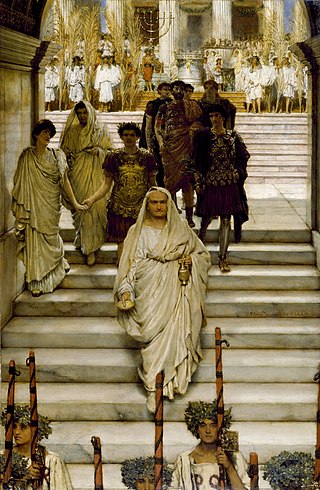
The Flavian dynasty, lasting from 69 to 96 CE, was the second dynastic line of emperors to rule the Roman Empire following the Julio-Claudians, encompassing the reigns of Vespasian and his two sons, Titus and Domitian. The Flavians rose to power during the civil war of 69 CE, known as the Year of the Four Emperors; after Galba and Otho died in quick succession, Vitellius became emperor in mid 69. His claim to the throne was quickly challenged by legions stationed in the eastern provinces, who declared their commander Vespasian emperor in his place. The Second Battle of Bedriacum tilted the balance decisively in favor of the Flavian forces, who entered Rome on 20 December, and the following day, the Roman Senate officially declared Vespasian emperor, thus commencing the Flavian dynasty. Although the dynasty proved to be short-lived, several significant historic, economic and military events took place during their reign.
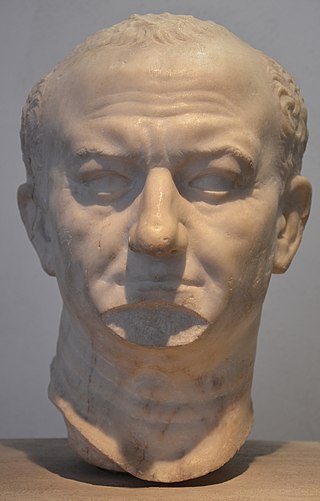
The gens Flavia was a plebeian family at ancient Rome. Its members are first mentioned during the last three centuries of the Republic. The first of the Flavii to achieve prominence was Marcus Flavius, tribune of the plebs in 327 and 323 BC; however, no Flavius attained the consulship until Gaius Flavius Fimbria in 104 BC. The gens became illustrious during the first century AD, when the family of the Flavii Sabini claimed the imperial dignity.
The Battle of Bedriacum refers to two battles fought during the Year of the Four Emperors near the village of Bedriacum, about 35 kilometers (22 mi) from the town of Cremona in northern Italy. The fighting in fact took place between Bedriacum and Cremona, and the battles are sometimes called "First Cremona" and "Second Cremona".

Lucius Flavius Silva Nonius Bassus was a late-1st-century Roman general, governor of the province of Iudaea and consul. Silva was the commander of the army, composed mainly of the Legio X Fretensis, in 72 AD that laid siege to the near-impregnable mountain fortress of Masada, occupied by a group of Jewish rebels dubbed the Sicarii by Flavius himself. The siege ended in 73 AD with Silva's forces breaching the defenses of the Masada plateau and the mass suicide of the Sicarii, who preferred death to defeat or capture. Silva's actions are documented by 1st-century Jewish-Roman historian Josephus, the remains of a 1st-century Roman victory arch identified in Jerusalem in 2005, and the extensive earthworks at the Masada site, a monument to the high-water mark of Roman siege warfare.
Titus Flavius T. f. T. n. Sabinus was a Roman politician and soldier. A native of Reate, he was the elder son of Titus Flavius Sabinus and Vespasia Polla, and brother of the Emperor Vespasian.
Cornelius Fuscus was a Roman general who fought campaigns under the Emperors of the Flavian dynasty. He first distinguished himself as one of Vespasian's most ardent supporters during the civil war of 69 AD, known as the Year of the Four Emperors. Vespasian's son Domitian employed Fuscus as prefect of the Praetorian Guard, a post he held from 81 until his death.
Pompeius Silvanus, fully Marcus Pompeius Silvanus Staberius Flavinus or Flavianus, was a Roman senator who was consul twice.
Claudius Apollinaris was a man of ancient Rome who succeeded Sextus Lucilius Bassus as the commander, or praefectus classis, of Lucius Vitellius's fleet at Misenum, when Bassus defected to Vespasian's side in the year 70 AD. Apollinaris himself soon defected to Vespasian as well, and he escaped with six galleys.
Lucius Annius Bassus was a Roman senator of the early Roman Empire, whose known career flourished under the reign of Vespasian. He was suffect consul in the nundinium of November to December AD 70 as the colleague of Gaius Laecanius Bassus Caecina Paetus.













